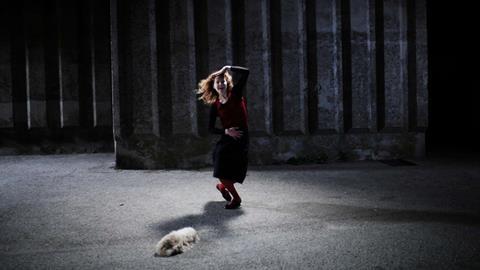Dir/scr: Paul Vecchiali. France. 2014. 94 mins

Schematic to a fault, mannerist all the way through, suggesting numerous interpretations which will no doubt challenge film critics, White Nights On The Pier (Nuits blanches sur la jetee) should rate mostly as an ‘exercise de style’ to display in special film-orientated events, but is pretty much beyond the limits of commercial distribution.
Vecchiali, more than any of his predecessors, is determined to leave behind any realistic attempt to deal with the material, choosing instead a kind of abstract approach which looks closer to a text recital on stage.
Coming barely a month after Kazakh director Nariman Turebaiev offered, in An Adventure, a version of Dostoyevsky’s much-adapted short story White Nights, here comes veteran French filmmaker Paul Vecchiali with yet another one, adding his name to a long list of such respectable names as Luchino Visconti and Robert Bresson (both acknowledged in the final credits).
Dostoyevsky’s story recounts four consecutive nights in the life of a nameless protagonist, a loner wondering through the streets of St. Petersburg at night, and his meeting with a girl named Nastenska, during which he finds out that she is waiting for a lover who had left town a year ago and promised to come back but hasn’t shown up yet.
She is desperately in love with that man, but is tormented by the fear of having been forgotten, while the protagonist, who first offers platonic sympathy to her plight, ends by becoming desperately in love with her. At the moment when she seems to give up hope of ever seeing the object of her love ever again and is ready to fall for her new suitor, the lover returns and she jumps into her arms, oblivious of all the doubts that had tortured her.
In Vecchiali’s version, the protagonist (Pascal Cervo) acquires a name, Fyodor, suggesting the character is none other than a reflection of Dostoyevsky himself. Indeed, quotes from other Dostoyevsky writings, such as The Idiot and particularly Letters From The Underground are inserted into his lines, to strengthen the impression. The name of the girl (Astride Adverbe) is now the more familiar Natasha, and she could easily be construed to be a figment of his imagination figuring in one of those dreams of love he refers to, in the course of their marathon conversations.
Vecchiali, more than any of his predecessors, is determined to leave behind any realistic attempt to deal with the material, choosing instead a kind of abstract approach which looks closer to a text recital on stage. The camera is mostly immobile, the framings are rigid, the moods are implied mostly by the changing lights, partly justified by a lighthouse in the background of the one set on which the whole action takes place.
Both interpreters fit the physical description suggested by the text - that is plain and relatively bland – and they focus on the delivering the embellished literate text rather than their own expressions, with Vecchiali squeezing himself into a cameo during the pre-credits prologue. As for the backdrop, a corner of the St. Maxime beach in the south of France (near St. Tropez), it is undistinguishable from any other off-season beach resort. All this, in an effort to do away with all eventual distractions and concentrate on what the story is supposed to deal with – the confrontation between tangible, practical love and its dreamlike idealised version.
Mainstream audiences will balk at this endless dialogue which could often be listened to, eyes closed (full credits to Francis Bonfanti and Eric Rozier for the quality of the sound), the one reason to stay awake being the scene in which the couple waltzes around and Adverbe pushes her partner away, launching into an improvised dance of her own. Film buffs, however, will pick the skeleton of Vecchiali’s Dostoyevsky’s rendition and no doubt provide all the necessary interpretations this strange version so badly needs.
Production company: Dialectik
International sales: Shellac, www.shellac-altern.org
Producer: Paul Vecchiali
Cinematography: Philippe Bottiglione
Editor Vincent Commaret, Paul Vecchiali
Production designer: Paul Vecchiali
Music: Catherine Vincent
Main cast: Astride Adverbe, Pascal Cervo, Genevieve Montaigu, Paul Vecchiali




















